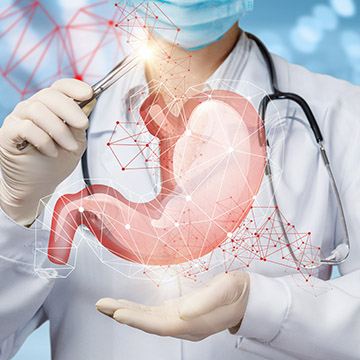At Arizona Gastrointestinal Associates in Scottsdale, we offer a wide range of diagnostic services and procedures to help identify and treat digestive health issues with accuracy and care. Note that this list may change at any time without notice.
Endoscopic Procedures
Upper Endoscopy (EGD)
An upper endoscopy uses a thin, flexible camera to look inside your esophagus, stomach, and upper small intestine. It helps diagnose problems like acid reflux, swallowing difficulties, stomach pain, or ulcers. The procedure is quick and usually done with light sedation.
Upper Endoscopy with Double Balloon Enteroscopy
This advanced procedure uses balloons to guide a special scope deep into the small intestine. It's often used when standard tests cannot find the cause of bleeding, inflammation, or tumors further down in the digestive tract.
Colonoscopy
A colonoscopy examines your large intestine (colon) with a flexible camera. It checks for polyps, cancer, or causes of bleeding, diarrhea, and abdominal pain. It's also a routine screening tool for colon cancer starting at age 45.
Colonoscopy with Double Balloon Enteroscopy
This specialized test allows doctors to explore areas beyond the colon into the small intestine. It's used when bleeding or disease is suspected deeper inside the digestive tract and other tests aren't enough.
Flexible Sigmoidoscopy
This test uses a flexible camera to view only the lower part of the colon and rectum. It helps diagnose causes of rectal bleeding, changes in bowel habits, and can be part of cancer screening programs.
Small Bowel Enteroscopy
This procedure examines areas of the small intestine that regular endoscopy or colonoscopy can't reach. It helps diagnose bleeding, Crohn's disease, or tumors deep in the digestive system.
Capsule Endoscopy
In this simple test, you swallow a tiny camera in a pill. As it travels through your intestines, it takes thousands of pictures. It's often used to find bleeding, tumors, or signs of Crohn's disease in the small intestine.
PillCam (Small Bowel Capsule Endoscopy)
PillCam is a brand of capsule endoscopy that captures high-quality images inside the small intestine. It's helpful for spotting problems that other tests might miss.
Ileoscopy
This procedure examines the last part of your small intestine, called the ileum. It's often done during a colonoscopy to help diagnose conditions like Crohn's disease or unexplained diarrhea.
ERCP (Endoscopic Retrograde Cholangiopancreatography)
ERCP is a special procedure that combines endoscopy and X-rays to check the bile ducts and pancreatic ducts. It can diagnose and treat blockages, stones, or tumors without surgery.
Esophageal & Anorectal Motility Testing
Bravo pH Test
This test measures the amount of acid in your esophagus over a few days to help diagnose GERD (acid reflux). A small capsule temporarily attaches to your esophagus and transmits information wirelessly.
pH Monitoring – 24 Hour
This test measures how much acid backs up into your esophagus over a 24-hour period. It's often used when diagnosing reflux disease (GERD).
Esophageal Motility (Manometry)
Manometry tests how well the muscles of your esophagus are working. It's used to find the cause of swallowing problems or chest pain that isn't related to the heart.
Anorectal Manometry
This test measures how well the muscles in your rectum and anus are working. It's often done to evaluate chronic constipation or loss of bowel control.
Breath & Stool Tests
Hydrogen Breath Tests
These simple, non-invasive tests measure gases in your breath to help diagnose problems like lactose intolerance, fructose intolerance, or bacterial overgrowth (SIBO) in the intestines.
Fructose Breath Hydrogen Test
This test checks for fructose intolerance, which can cause bloating, gas, and diarrhea after eating foods like fruit or sugary snacks.
Glucose Hydrogen Breath Test
This breath test looks for small intestinal bacterial overgrowth (SIBO) by measuring gas production after drinking a glucose solution.
Lactose Breath Hydrogen Test
This test measures how your body digests lactose, the sugar found in milk. It's used to diagnose lactose intolerance, a common cause of bloating and diarrhea after dairy products.
H. pylori Breath Test
This simple test detects an infection with H. pylori, a type of bacteria that can cause ulcers, stomach pain, or indigestion.
H. pylori Stool Antigen Test
This test looks for signs of H. pylori infection in a stool sample and can help diagnose ulcers or chronic stomach inflammation.
Fecal Elastase
This stool test measures an enzyme to check how well your pancreas is working. It can help diagnose pancreatic problems that affect digestion.
Infusion & Therapeutic Procedures
Infliximab (Remicade) Infusion
Infliximab is a medication given through an IV (infusion) to treat autoimmune diseases like Crohn's disease and ulcerative colitis. It helps reduce inflammation and control symptoms.
Hemorrhoid Treatments
Hemorrhoid Banding
Hemorrhoid banding involves placing a small rubber band around an internal hemorrhoid. This cuts off the blood supply, causing it to shrink and fall off naturally.
IRC (Infrared Coagulation)
IRC uses infrared light to treat small internal hemorrhoids. It's quick, effective, and involves minimal discomfort and recovery time.
Specialized GI Interventions
Percutaneous Endoscopic Gastrostomy Tube (PEG)
This procedure places a feeding tube directly into the stomach through the skin, for people who can't eat normally due to illness or surgery.
Percutaneous Liver Biopsy
This procedure removes a small sample of liver tissue through the skin to help diagnose conditions like hepatitis, fatty liver disease, or liver cancer.
EsoGuard Test for Barrett's Esophagus
EsoGuard is a simple DNA test used to screen for Barrett's Esophagus, a condition that can increase the risk of esophageal cancer. It does not require sedation or traditional endoscopy.
Halo 90 and 360 Ablation
These treatments use radiofrequency energy to destroy abnormal cells in the esophagus, especially in patients with Barrett's Esophagus, reducing cancer risk.
Allergy, Sensitivity & Gut Health Testing
Food Allergy Testing
This testing identifies immune system reactions to specific foods that might be causing digestive symptoms, rashes, or other allergic responses.
Food Sensitivity Testing
Food sensitivity tests identify foods that may be causing non-allergic symptoms like bloating, headaches, or fatigue when eaten regularly.
Gluten Testing
Gluten testing checks for signs of celiac disease or gluten sensitivity, helping determine whether a gluten-free diet could improve your health.
Gut Microbiome Support (Probiotics & Prebiotics)
Supporting your gut health with probiotics (good bacteria) and prebiotics (their food) can improve digestion, reduce inflammation, and promote better overall wellness.
Cancer Screening
Colon Cancer Screening
Colon cancer screening typically involves a colonoscopy to find and remove polyps before they can become cancerous. Screening is recommended starting at age 45 for most adults.
Stomach Cancer Evaluation
Stomach cancer can be detected through upper endoscopy and biopsy if symptoms like persistent pain, weight loss, or difficulty eating are present.
Pancreatic Cancer Evaluation
Pancreatic cancer is often detected using imaging tests, ERCP, or endoscopic ultrasound. Early diagnosis can be challenging but is critical for treatment.
EsoGuard Test (Esophageal Cancer Risk)
This non-invasive test screens for Barrett's Esophagus, a condition that increases the risk of esophageal cancer. It helps identify patients who may need closer monitoring or treatment.
Percutaneous Liver Biopsy (Liver Cancer Detection)
A liver biopsy can detect cancerous changes in liver tissue and help guide treatment if liver cancer or cirrhosis is suspected.
Capsule Endoscopy (Small Bowel Tumor Screening)
Capsule endoscopy can find tumors in the small intestine that may be missed by other tests. It's especially helpful when there is unexplained bleeding or anemia.
ERCP (Biliary & Pancreatic Cancer Evaluation)
ERCP helps diagnose cancers or blockages in the bile ducts and pancreas by providing detailed images and allowing biopsies or treatments during the procedure.




